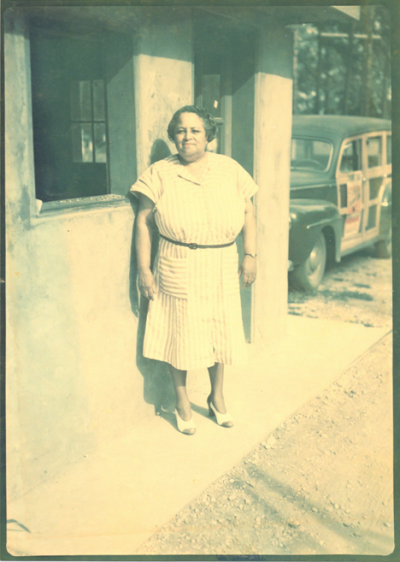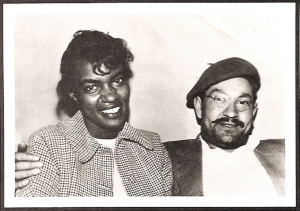|
SPARROW'S
BEACH
A PERIOD IN TIME
 Mary
“Florence” Carr Sparrow (1890 – 1989) was the owner
of Sparrow’s Beach, a private beach that Florence ran as a
successful business for over 40 years. She had a vision of making
this place an enjoyable and family-oriented establishment that every
African-American could enjoy during the time when African-Americans
were treated unfairly and as second-class citizens. My grandmother
was a successful farmer, real estate investor, and a highly respected
black woman in her community. Mary
“Florence” Carr Sparrow (1890 – 1989) was the owner
of Sparrow’s Beach, a private beach that Florence ran as a
successful business for over 40 years. She had a vision of making
this place an enjoyable and family-oriented establishment that every
African-American could enjoy during the time when African-Americans
were treated unfairly and as second-class citizens. My grandmother
was a successful farmer, real estate investor, and a highly respected
black woman in her community.
My
grandmother respected and looked up to her father, Frederick Carr,
who was a prominent figure in the community. I did read a story
that my great-grandfather Frederick was a runaway slave. I am not
sure if that is accurate because my grandmother always spoke proudly
about her father being a Free Slave, businessman, and great father.
Mr. Carr had friends such as Booker T. Washington who would stop
by to see him during their travels to discuss the painful issues
of Blacks during that time.
Interestingly
enough, my grandmother was a very private person. She did not approve
of other people talking about her beach, which she worked so hard
to run as a black woman during very difficult times. With only a
high school education, she was the Oprah of her time. She had motel
rooms, picnic tables, boat rides, entertainment, and food stands
for everyone to enjoy. She operated her beach efficiently and kept
it very clean. I would like to think the three loves of her life
were her husband William Sparrow, her son Albert Sparrow and me.
Carr’s
Beach was operated by Elizabeth Smith, who was one of Mrs. Sparrow’s
older sisters. The misconception is that Carr’s Beach was the
happening place, but the truth of the matter is that everything
my grandmother did at her beach, her sister also tried to emulate.
 Mrs.
and Mr. Albert and Jean Sparrow
Mrs.
and Mr. Albert and Jean Sparrow
|
 The
log cabin Mrs. Sparrow's son and
The
log cabin Mrs. Sparrow's son and
daughter-in-law lived in. |
Because
of eminent domain in Anne Arundel County, the government took many
acres away from Florence Sparrow to establish a sewage plant. She
fought for over 5 years to try to keep her property. Mrs. Sparrow’s
saying was “All I want to do is grow my corn and tobacco.”
She did not sell Sparrow’s Beach to make way for the sewage
plant. There were many other factors involved in her decision to
sell, like the opening of Sandy Point and that many blacks now wanted
to be accepted in white establishments, so they stopped coming to
Sparrow’s and Carr’s beaches, and her beloved son passed
away at a very young age.
To
honor my grandmother and everything she has accomplished, I have
provided personal pictures of Sparrow’s Beach, my grandmother,
and many more. Mrs. Sparrow and Elizabeth Smith are a part of African-American
history.
Warmest
regards,
Jeanne Sparrow
|
![]()
![]()
![]()
![]()
![]()
![]()
![]()
![]()
![]()
![]()
![]()






 Mary
“Florence” Carr Sparrow (1890 – 1989) was the owner
of Sparrow’s Beach, a private beach that Florence ran as a
successful business for over 40 years. She had a vision of making
this place an enjoyable and family-oriented establishment that every
African-American could enjoy during the time when African-Americans
were treated unfairly and as second-class citizens. My grandmother
was a successful farmer, real estate investor, and a highly respected
black woman in her community.
Mary
“Florence” Carr Sparrow (1890 – 1989) was the owner
of Sparrow’s Beach, a private beach that Florence ran as a
successful business for over 40 years. She had a vision of making
this place an enjoyable and family-oriented establishment that every
African-American could enjoy during the time when African-Americans
were treated unfairly and as second-class citizens. My grandmother
was a successful farmer, real estate investor, and a highly respected
black woman in her community.